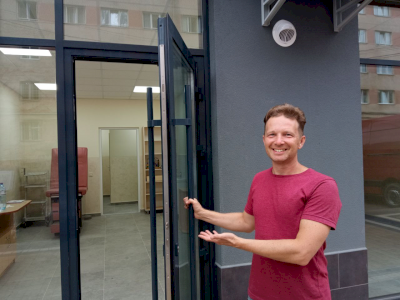Ukrainian family doctor's secrets on building resilience during war. During the short keynote lecture Pavlo Kolesnyk will share his observations on challenges and strengthening of resilience in different groups of population during war in Ukraine. The presentation is planned as a symbol of “surfing on the waves of life” during war.
Friday 6 October, 9:20

The IDP our staff deals with minor children, single parents, elderly without family support, single or unaccompanied women, pregnant or lactating women, female-headed households without their male heads who became soldiers, widows or orphans, disabled and traumatized individuals. The goal of the Interfamily Clinic is to help this most vulnerable layer of Ukrainian society survive and keep it healthy enough to lift Ukraine out of ruins one day.
The team regards the Clinic as “a cadre forge”. Now after many months of the war Ukrainian doctors, residents and medical students have significant experience in providing medical humanitarian assistance to internally displaced people and local population during emergency situations. Their invaluable experience can be worth sharing with the international colleagues in both directions by hosting the international specialists here in Ukraine, the same as by their practicing abroad.
The Interfamily Clinic is a unique medical institution in Ukraine. It serves two important missions: (1) to provide high quality and full spectrum care for IDP and refugee families, and (2) to serve as an excellent facility for medical education for student doctors and family practice residents
The possibility of obtaining practical knowledge working with the patients attracts residents and medical students even from other faculties of Uzghorod University.
The residents take part in the work of the laboratory: their task is to regulate the stream of the patients or participate in analysis decipherment and by this getting their own professional niche. In order to rotate young doctors and residents professionally the Clinic has implemented the American and European hands-on- practice and hands-on -teaching system. Such a doctor-assistant system first, increases the number of residents involved in the process even from other clinics and secondly, gives them a real chance to test themselves in practical work. The “three pair eyes” rule ( a doctor, a resident, a student) has been also implemented while treating one patient in order not to make a performance out of the process and not to embarrass a patient. As soon as a student gains experience he becomes an assistant. An assistant gets his scholarship while a student gets free education.
What doesn’t kill us makes us stronger